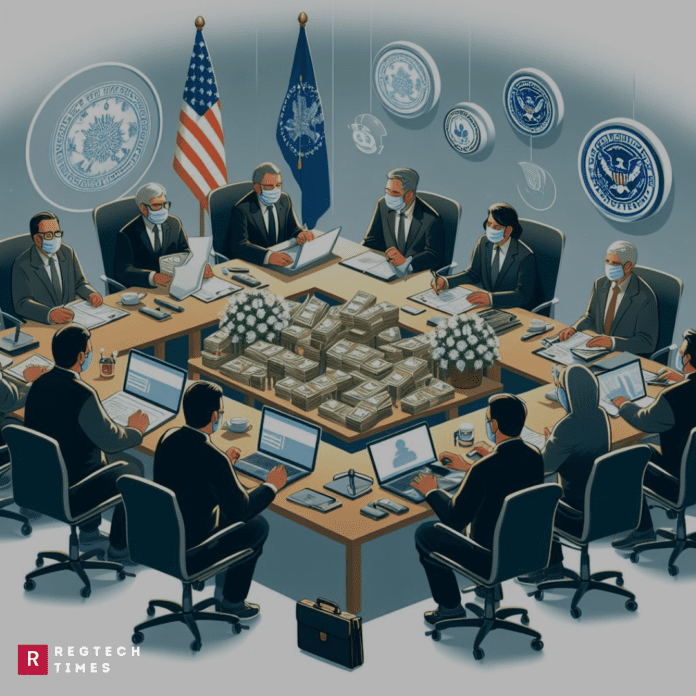Financial technology company Kabbage Inc., operating as KServicing, has reached a resolution with the Justice Department over allegations of violating the False Claims Act (FCA) in connection with the Paycheck Protection Program (PPP). This resolution comes amidst Kabbage’s bankruptcy proceedings, filed in October 2022, marking a significant development in holding accountable those accused of misusing COVID-19 relief funds.
Background
The Paycheck Protection Program (PPP), established in March 2020 under the CARES Act, aimed to aid small businesses grappling with the pandemic’s economic fallout. Administered by the U.S. Small Business Administration (SBA), it provided federally guaranteed loans with provisions for forgiveness under specific conditions. This lifeline helped businesses maintain payroll, meet expenses, and pursue recovery efforts while incentivizing job retention and alleviating debt burdens. The PPP symbolized government support for economic resilience, safeguarding jobs and fostering recovery amidst unprecedented challenges.
Allegations Against Kabbage
The allegations against Kabbage include knowingly submitting thousands of false claims for loan forgiveness, loan guarantees, and processing fees to the SBA. The company stands accused of inflating PPP loans, leading to the disbursement of funds exceeding eligible amounts for borrowers under program guidelines. Moreover, it’s alleged that Kabbage failed to implement adequate fraud controls, disregarding its obligations under the PPP and Bank Secrecy Act/Anti-Money Laundering (BSA/AML) requirements.
Kabbage Inc. Agrees to Resolve Allegations That the Company Defrauded the Paycheck Protection Program
— DOJ Civil Division (@DOJCivil) May 13, 2024
????: https://t.co/7Klg2XLOs4 pic.twitter.com/HHOzjQFOP9
Government Response
Principal Deputy Assistant Attorney General Brian M. Boynton emphasized the Justice Department’s commitment to holding lenders accountable for their role in potentially exacerbating misuse of pandemic relief funds. Acting U.S. Attorney Joshua S. Levy for the District of Massachusetts underscored the severity of Kabbage’s actions, stating that the company prioritized profit over safeguarding taxpayer funds during a national crisis.
Resolution of Allegations:
The resolution addresses two primary violations attributed to Kabbage. Firstly, the company is alleged to have improperly calculated payroll costs by double-counting state and local taxes, failing to exclude excessive compensation, and inaccurately assessing employer payments for leave and severance. Secondly, Kabbage purportedly neglected fraud prevention measures, removing underwriting steps to expedite loan processing and maximize fees, despite knowledge of the heightened risks of fraudulent activities.
Settlement Terms
As part of the settlement, Kabbage, now operating as KServicing Wind Down Corp., will pay a total allowed, unsubordinated, general unsecured claim of up to $120 million in the bankruptcy proceeding. Additionally, the company will receive a $12.5 million credit for previously returned payments to the SBA during the investigation.
Whistleblower Claims
The resolution also involves qui tam or whistleblower claims filed under the False Claims Act, highlighting the collaborative effort between private citizens and governmental authorities in uncovering alleged misconduct. These claims underscore the critical role of whistleblowers in exposing fraud and holding perpetrators accountable.
Government Task Force Response:
The establishment of the COVID-19 Fraud Enforcement Task Force in May 2021 demonstrates the government’s proactive approach to combatting pandemic-related fraud. This task force leverages resources across federal agencies to investigate and prosecute fraudulent activities, ensuring the integrity of relief programs and taxpayer funds.
Collaborative Investigation
The investigation into Kabbage’s conduct represents a coordinated effort involving various government entities, including the Justice Department, FBI, and SBA. By holding Kabbage accountable, authorities aim to send a clear message that non-compliance with program rules and fraud will not be tolerated, especially during times of national crisis.
Conclusion
In conclusion, the resolution regarding Kabbage underscores the vital need for transparency, accountability, and integrity in managing pandemic relief funds. The Paycheck Protection Program was designed to aid struggling businesses during COVID-19, but instances of fraud, like those alleged against Kabbage, erode trust and hinder effective relief efforts. As we navigate ongoing economic challenges, maintaining strict oversight and ethical administration of relief programs is essential to ensure resources reach those most in need. Collaboration between government and private sectors is crucial in strengthening compliance measures and deterring fraudulent behavior, ultimately safeguarding relief efforts and supporting a resilient recovery.


